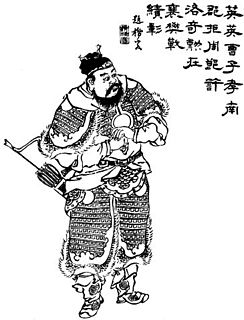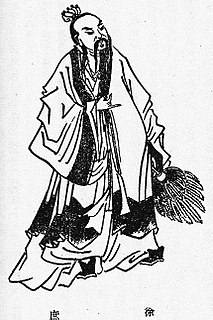Odd Tablet (as David Hawkes translates his pen name), or more literally, Elderly Maimed Tablet (畸笏叟), was a mysterious commentator of the 18th-century Chinese novel Dream of the Red Chamber . He sometimes signed himself as merely 畸笏 ("Maimed Tablet"). Together with Zhiyanzhai, they were regarded as the two most significant commentators of the Rouge manuscripts. Apparently quite old and an elder (叟 means "Elderly Man"), his comments, like Zhiyanzhai's, were often also in red ink in some Rouge manuscripts.
A pen name is a pseudonym adopted by an author and printed on the title page or by-line of their works in place of their "real" name. A pen name may be used to make the author's name more distinctive, to disguise their gender, to distance an author from some or all of their previous works, to protect the author from retribution for their writings, to combine more than one author into a single author, or for any of a number of reasons related to the marketing or aesthetic presentation of the work. The author's name may be known only to the publisher or may come to be common knowledge.
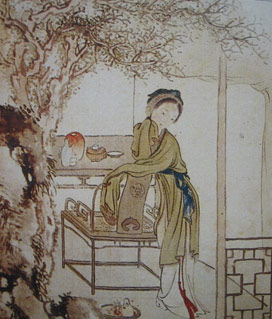
Dream of the Red Chamber, also called The Story of the Stone, or Hongloumeng, composed by Cao Xueqin, is one of China's Four Great Classical Novels. It was written some time in the middle of the 18th century during the Qing dynasty. Long considered a masterpiece of Chinese literature, the novel is generally acknowledged to be the pinnacle of Chinese fiction. "Redology" is the field of study devoted exclusively to this work.
Zhiyanzhai was the pseudonym of an early and mysterious commentator of the 18th-century Chinese novel Dream of the Red Chamber. This person was a contemporary of the author Cao Xueqin who knew the author intimately enough to be regarded as the chief commentator of his work while it was still unpublished. Most early hand-copied manuscripts of the novel contain red or black-inked commentaries by a few unknown commentators, considered authoritative enough to be transcribed by scribes into subsequent generations of copies. Zhiyanzhai was the most prominent of these commentators. Early copies of Dream were known as 脂硯齋重評石頭記. These versions are known as 脂本, or "Rouge Versions", in Chinese. They are the manuscripts with the highest textual reliability.
畸 can mean "maimed", "unevenly shaped", "abnormal" or "leftover". 笏 was a long, rectangular tablet that court officials used to record matters when reporting their duties to the Chinese Emperor. These emblematic tablets were made of jade, ivory, wood or bamboo. [1]
Emperor or Huangdi was the imperial title of the Chinese sovereign from 221 BCE to the early 20th century. It was established by Qin Shi Huang, the First Emperor, after the reunification of the lands of the Zhou dynasty. It replaced the Zhou's own title of wáng ("king"), which had been appropriated by numerous warlords during the Warring States Era. The Chinese title is not grammatically gendered, but the only empress to bear it was Wu Zetian, who briefly replaced the Tang dynasty with her own in the years 690–705 CE. Use of the title is considered to have officially ended with the abdication of Puyi in 1912 following the Xinhai Revolution and the establishment of the Republic of China, although there were two failed attempts to reestablish an imperial government in China in 1915 and 1917.

Jade refers to an ornamental mineral, mostly known for its green varieties. It can refer to either of two different minerals: nephrite, a silicate of calcium and magnesium, or jadeite, a silicate of sodium and aluminium.

Ivory is a hard, white material from the tusks and teeth of animals, that consists mainly of dentine, one of the physical structures of teeth and tusks. The chemical structure of the teeth and tusks of mammals is the same, regardless of the species of origin. The trade in certain teeth and tusks other than elephant is well established and widespread; therefore, "ivory" can correctly be used to describe any mammalian teeth or tusks of commercial interest which are large enough to be carved or scrimshawed. It has been valued since ancient times in art or manufacturing for making a range of items from ivory carvings to false teeth, fans, dominoes and joint tubes. Elephant ivory is the most important source, but ivory from mammoth, walrus, hippopotamus, sperm whale, killer whale, narwhal and wart hog are used as well. Elk also have two ivory teeth, which are believed to be the remnants of tusks from their ancestors.
As with Zhiyanzhai, the identity of Odd Tablet has eluded modern Redologists, with some experts believing that they could be the same person. But noted Redologist Cai Yijiang (蔡義江) wrote an essay speculating that Odd Tablet should be author Cao Xueqin's father. [2] What is known for certain now is that Odd Tablet was a person of some authority over Cao Xueqin. He ordered Cao Xueqin to remove a passage detailing the incestuous adultery between Qin Keqing and her father-in-law from Xueqin's original text, leading to Cao Xueqin resorting to very oblique references when writing the sensitive passage. [3] The incident appeared to be based on a household scandal during Cao Xueqin's grandfather, Cao Yin's (曹寅) lifetime. [4]
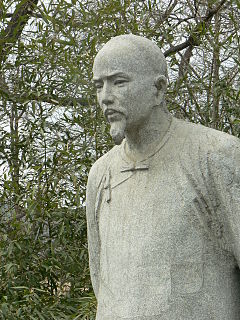
Cáo Xuěqín ; was a Chinese writer during the Qing dynasty. He is best known as the author of Dream of the Red Chamber, one of the Four Great Classical Novels of Chinese literature. His given name was Cáo Zhān (曹霑) and his courtesy name was Mèngruǎn.
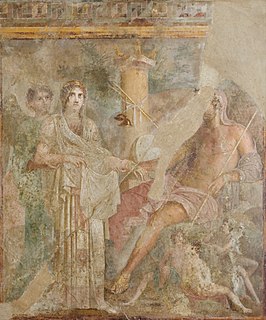
Incest is human sexual activity between family members or close relatives. This typically includes sexual activity between people in consanguinity, and sometimes those related by affinity, adoption, clan, or lineage.
Adultery is extramarital sex that is considered objectionable on social, religious, moral, or legal grounds. Although the sexual activities that constitute adultery vary, as well as the social, religious, and legal consequences, the concept exists in many cultures and is similar in Christianity, Islam, and Judaism. A single act of sexual intercourse is generally sufficient to constitute adultery, and a more long-term sexual relationship is sometimes referred to as an affair.
Odd Tablet outlived Cao Xueqin, becoming the guardian of Cao's working papers. Odd Tablet complained that some pages of the original manuscript were lost because someone had borrowed and then mislaid them. Cao Xueqin died without putting together a cohesive final version of his novel for publication. [5] What we do have is Cao Xueqin's extant first eighty chapters.
Odd Tablet appeared to be some melancholic elder who had gone through the catastrophe of the Cao family's downfall decades ago. He used frequent phrases like 嘆嘆! ("Alas!"), 哭 ("weep"), 傷哉!(an expression of deep grief) in Classical Chinese, and seemed especially troubled by references to the Cao family's sacking. [6] Cai concluded that Odd Tablet should be Cao Fu (曹頫), adopted son and paternal nephew of Cao Yin (曹寅). Cai supports the idea that Cao Yin was Cao Xueqin's paternal grandfather (or, in terms of blood relations, paternal granduncle). In the essay, Cai proposes that Cao Fu ought to be Cao Xueqin's real father. As the head of the household Cao Fu was imprisoned for years by the Yongzheng Emperor. [7] Cai speculates that Fu was maimed during this imprisonment, hence Odd Tablet's frequent repetitions of the phrase 癈人 ("useless/maimed person") and 畸 ("abnormal" or "maimed"). [8]
Classical Chinese, also known as Literary Chinese, is the language of the classic literature from the end of the Spring and Autumn period through to the end of the Han dynasty, a written form of Old Chinese. Classical Chinese is a traditional style of written Chinese that evolved from the classical language, making it different from any modern spoken form of Chinese. Literary Chinese was used for almost all formal writing in China until the early 20th century, and also, during various periods, in Japan, Korea and Vietnam. Among Chinese speakers, Literary Chinese has been largely replaced by written vernacular Chinese, a style of writing that is similar to modern spoken Mandarin Chinese, while speakers of non-Chinese languages have largely abandoned Literary Chinese in favor of local vernaculars.

The Yongzheng Emperor, born Yinzhen, was the fifth emperor of the Manchu-led Qing dynasty and the third Qing emperor to rule over China proper. He reigned from 1723 to 1735. A hard-working ruler, the Yongzheng Emperor's main goal was to create an effective government at minimal expense. Like his father, the Kangxi Emperor, the Yongzheng Emperor used military force to preserve the dynasty's position. His reign was known for being despotic, efficient, and vigorous.




